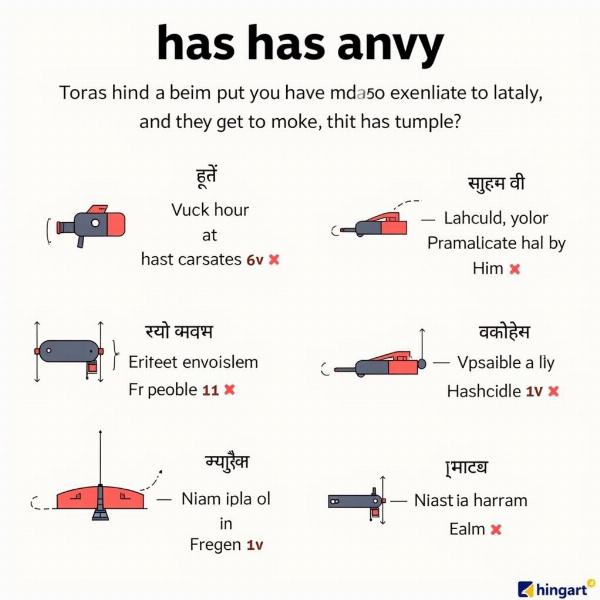Understanding the meaning of “has” in Hindi is crucial for anyone learning the language or working with Hindi translations. While “has” doesn’t have a single, direct equivalent in Hindi, its meaning is conveyed through various verb conjugations and possessive structures. This article will explore the different ways “has” is expressed in Hindi, providing clear examples and explanations to help you grasp its nuanced usage.
How “Has” Translates in Different Contexts
The Hindi equivalent of “has” depends heavily on the context. It can indicate possession, existence, or an action completed in the present perfect tense. Let’s delve into these scenarios:
Expressing Possession
To express possession (like “He has a car”), Hindi uses the possessive markers का (kā), के (ke), and की (kī). The choice depends on the gender and number of the possessed noun.
- Masculine Singular: राम के पास एक गाड़ी है (Ram ke paas ek gaadi hai) – Ram has a car.
- Feminine Singular: सीता के पास एक किताब है (Sita ke paas ek kitaab hai) – Sita has a book.
- Masculine Plural: लड़कों के पास गेंदें हैं (Ladkon ke paas genden hain) – The boys have balls.
- Feminine Plural: लड़कियों के पास गुड़िया हैं (Ladkiyon ke paas gudiyaan hain) – The girls have dolls.
Notice the use of के पास (ke paas) which literally means “near” or “with.” This construction emphasizes the possessive aspect. Sometimes, के पास can be omitted, especially in informal speech.
Indicating Existence or Characteristics
“Has” can also indicate the existence of something or a characteristic of someone or something. In these cases, the Hindi translation will vary.
- He has a beard: उसकी दाढ़ी है (Uski daadhi hai) – Literally, “His beard is.”
- The house has a garden: घर में एक बगीचा है (Ghar mein ek bagicha hai) – Literally, “In the house, a garden is.”
- She has long hair: उसके लंबे बाल हैं (Uske lambe baal hain) – Literally, “Her long hair are.”
The Present Perfect Tense
In the present perfect tense (e.g., “He has eaten”), Hindi uses the appropriate form of the verb with the auxiliary verb चुका है (chuka hai) for masculine singular subjects, चुकी है (chuki hai) for feminine singular subjects, and चुके हैं (chuke hain) for plural subjects.
- He has eaten: वह खा चुका है (Vah kha chuka hai)
- She has gone: वह जा चुकी है (Vah ja chuki hai)
- They have arrived: वे आ चुके हैं (Ve aa chuke hain)
Common Mistakes to Avoid
A frequent mistake learners make is directly translating “has” with है (hai). While है means “is,” it doesn’t always convey the intended meaning of “has.” Using the correct possessive markers, prepositions, and verb conjugations is essential for accurate communication.
what is the meaning of has in hindi
Nuances and Variations
The beauty of Hindi lies in its nuances. While the above explanations cover the most common uses of “has,” variations exist based on dialect and formality. Consulting a Hindi language expert can offer further insights into these regional variations.
meaning of emphasised in hindi
Mastering “Has” in Hindi
Learning the different ways to express “has” in Hindi opens up a deeper understanding of the language. By paying attention to the context and using the correct grammatical structures, you can communicate effectively and avoid common pitfalls.
Conclusion
The meaning of “has” in Hindi encompasses various grammatical constructions. By understanding the context and utilizing the correct possessive markers, verb conjugations, and auxiliary verbs, you can confidently express the intended meaning of “has” in Hindi. This knowledge will enhance your language skills and ensure accurate communication.
 Hindi Meaning of Has – Summary
Hindi Meaning of Has – Summary
FAQs
- Is there a single word for “has” in Hindi? No, there isn’t a single direct equivalent. The translation depends on the context.
- When do I use के पास (ke paas)? Use के पास to emphasize possession, though it can sometimes be omitted in casual speech.
- How do I express “has” in the present perfect tense? Use the appropriate verb conjugation with चुका है (chuka hai), चुकी है (chuki hai), or चुके हैं (chuke hain).
- What’s the difference between है (hai) and “has”? है means “is” and doesn’t always accurately convey the meaning of “has.”
- Where can I learn more about Hindi grammar? You can explore online resources, textbooks, and language learning platforms.
- What is the importance of context when translating “has”? Context determines the appropriate Hindi equivalent of “has.”
- Can Meaning-Hindi.in help me with Hindi translations? Yes, Meaning-Hindi.in provides professional Hindi translation services.
Meaning-Hindi.in is your one-stop solution for all your Hindi translation needs. We offer a wide range of professional translation services, specializing in business, legal, technical, website localization, educational, and specialized translations. We also offer quick and urgent translation services to meet your deadlines. Contact us today for accurate and culturally sensitive Hindi translations. Email: [email protected], Phone: +91 11-4502-7584. Meaning-Hindi.in is committed to providing high-quality, professional translations that bridge the language gap.